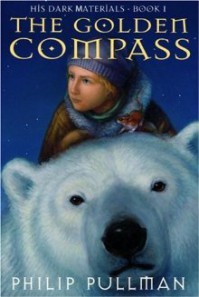Breathtakingly original

I can't count the number of times I've listened to (never read) this book in the past several years. I highly recommend the audio version, which is performed by the author and a full cast. I cannot praise the whole trilogy too highly. What it seems to me that Pullman is doing, essentially, is creating a secular humanist "mythology," in which an inversion of Paradise Lost, fragments of gnosticism, and the "many worlds" theory of quantum physics are among the many things that provide grist for the mill of his wonderfully creative imagination. It has also been referred to as the "anti-Narnia," although in my view that is unfair. While Pullman has been openly critical of the Narnia series and has a decidedly uncomplimentary view of organized religion in general, and his critics may certainly carp at the malignant, monolithic Church of Lyra's world, I think that he presents a positive vision for living in this world, where so many, particularly young adults, at whom the series in aimed, have been appalled at both the excesses of fundamentalism and the anemic responses of "mainstream" religion. Nor on careful reading, does he seem to me to come down definitely on one side or the other of the "God" question, as Lyra, at the end of this book, rejects the absolutism of both Lord Asriel and Mrs. Coulter.
One unique feature of Pullman's world, or at least the alternate version in which The Golden Compass is set, is that every human being is accompanied through life by a manifestation of his or her soul, usually of the opposite sex and always in animal form, called a daemon. During the early years of a person's life, her daemon can take many different forms, but during the teen years when her personality becomes fixed, her daemon will "settle" in a single form, often indicating the type of person she is. The idea of the daemon has been referred to by many as Pullman's most brilliant innovation, although of course it has roots in traditional cultures and some analogues in Jungian psychology.
Whether as an ironic nod to Narnia or not, The Golden Compass begins with a wardrobe. Lyra Belacqua, an orphan who has been placed by her uncle Lord Asriel in the care of the scholars of Jordan College, Oxford, is trapped in the retiring room and is forced to hide in the wardrobe. She hears her uncle give a presentation to the scholars about the aurora borealis and a mysterious substance called Dust, which only seems to be attracted to adults. As we learn later, the Church, a curious amalgamation of the worst elements of Calvinism and Catholicism, considers Dust to be the physical manifestation of Original Sin, and the race is on to either control it or destroy it. Lyra's quest to find her kidnapped friend Roger, to deliver the alethiometer (the Golden Compass, or truth-measurer of the title) to Lord Asriel, and to discover the nature of Dust will take her to London, through the Fen country of England, to the northern reaches of Europe, and finally into the "other world" behind the aurora.
Lyra, as it turns out, is pivotal in this struggle, and her allies include the Gyptians (Gypsies); armored bears, an intelligent and warlike species of polar bear; witches, a fierce and long-lived race of women from the far north; and Lee Scoresby, an aeronaut from Texas. Her antagonists include the Church, mainly a group known as the General Oblation Board; the beautiful, seductive (to children, in a non-sexual way, as well as to adults) Mrs. Coulter, and, in the end, Lord Asriel as well. Until the middle of the second book I was unsure which "side" he was on, but that is one of the wonderful things about this series, and one of the dangerous things, to those who like their morality black and white. There is no absolute good or evil, alliances shift with events, and the reader is left to find his or her way through the maze, together with Lyra.
I believe that Lyra herself is one of the great characters in literature. She is alive, insatiably curious, passionate, and deeply flawed. At the beginning of this book, she is a "coarse, greedy little savage" in the words of her creator, and her main talents are what J.K. Rowling would call "skiving off" her lessons and lying. Her strengths are a fierce loyalty to her friends and to her sense of what is "right," a comfort in her own skin that is remarkable for someone who has received very little nurturing in her life, and a natural knack for leadership. Many people might object to her lying and defiance of authority, but of course a "good" girl would never have been sneaking into the retiring room in the first place, much less had (or survived) the other challenges that Lyra ends up facing, and even by the end of the first book she has learned and changed a great deal. Before the climax of The Amber Spyglass, she will have learned the importance of truth in a most painful way and will be well on her way to becoming a strong, passionate woman.
This is one of those books that can be enjoyed as an adventure story at a relatively early age (though not before 10 or 11 at the least, in my opinion) but read later in life as a profound commentary on good and evil, death and the soul, free will and destiny. It literally takes my breath away every time I read it.
 2
2










